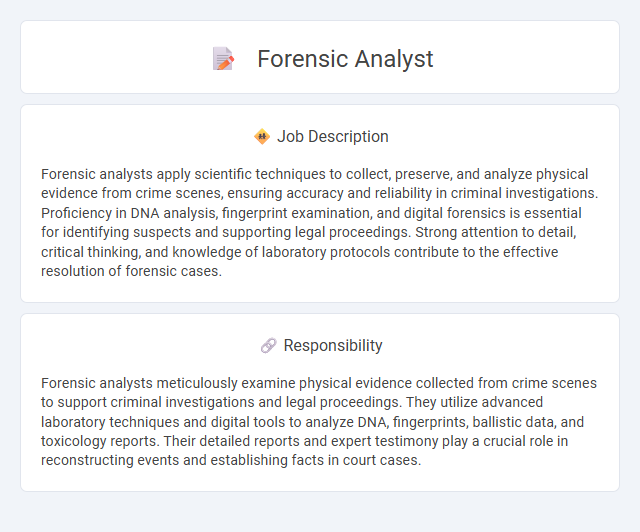
Forensic analysts apply scientific techniques to collect, preserve, and analyze physical evidence from crime scenes, ensuring accuracy and reliability in criminal investigations. Proficiency in DNA analysis, fingerprint examination, and digital forensics is essential for identifying suspects and supporting legal proceedings. Strong attention to detail, critical thinking, and knowledge of laboratory protocols contribute to the effective resolution of forensic cases.
Individuals who demonstrate strong attention to detail, analytical thinking, and emotional resilience are more likely to be suitable for a forensic analyst role. Those who may struggle with high-pressure environments or handling graphic evidence might find the job challenging. It is probable that candidates with a methodical mindset and a passion for investigative work thrive best in this field.
Qualification
Forensic analysts typically require a bachelor's degree in forensic science, chemistry, biology, or a related field, with many employers preferring candidates holding advanced degrees or certifications such as Certified Forensic Scientist (CFS) or International Association for Identification (IAI) credentials. Strong knowledge of criminalistics, laboratory techniques, and data analysis is essential, along with proficiency in specialized software and forensic tools. Effective communication skills and meticulous attention to detail are critical for accurately interpreting evidence and presenting findings in legal contexts.
Responsibility
Forensic analysts meticulously examine physical evidence collected from crime scenes to support criminal investigations and legal proceedings. They utilize advanced laboratory techniques and digital tools to analyze DNA, fingerprints, ballistic data, and toxicology reports. Their detailed reports and expert testimony play a crucial role in reconstructing events and establishing facts in court cases.
Benefit
Forensic analyst jobs likely offer significant benefits including the potential for competitive salaries and opportunities for career advancement in law enforcement or private sectors. Access to cutting-edge technology and ongoing training might enhance professional skills and job satisfaction. Job stability could be probable due to the consistent demand for crime investigation expertise.
Challenge
Forensic analysts likely encounter complex challenges requiring meticulous attention to detail and advanced problem-solving skills. They probably must navigate high-pressure environments where accuracy and precision directly impact legal outcomes. The role may demand continuous learning to stay current with evolving technologies and forensic methodologies.
Career Advancement
Forensic analysts can advance their careers by gaining specialized certifications such as the Certified Forensic Computer Examiner (CFCE) or the International Association of Computer Investigative Specialists (IACIS) certification. Experience in digital forensics, crime scene investigation, and toxicology enhances opportunities for promotion to supervisory or managerial roles in forensic laboratories or law enforcement agencies. Pursuing advanced degrees in forensic science, criminal justice, or related fields further supports career growth and access to higher-level positions.
 kuljobs.com
kuljobs.com